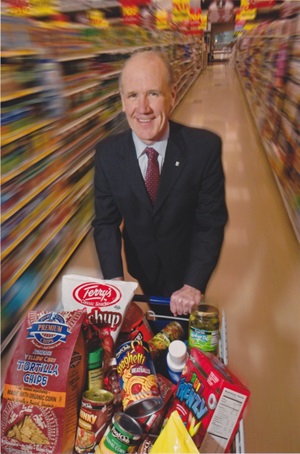By: Jennifer Hatcher, Senior Vice President, Government and Public Affairs, Food Marketing Institute

Last week, FMI President and CEO, Leslie Sarasin, joined Reps. Cathy McMorris Rodgers (R-WA), Loretta Sanchez (D-CA), Renee Ellmers (R-NC), Steve Womack (R-AR), NGA and Dominos at a press event to more publicly introduce the Common Sense Nutrition Disclosure Act of 2015 (H.R. 2017) to address several problems with FDA’s final menu labeling regulations that are scheduled to be effective December 1, 2015.
After the event, we had a chance to talk to Steve Smith, president and CEO of K-VA-T Food Stores, Inc. in more detail about the issue of menu labeling and what it means for food retail business.
What do you see as the biggest challenge for supermarkets complying with the FDA menu labeling final rule?
First, we see our company as a collection of independent retailers and we encourage regionally appropriate dishes that reflect the creativity and entrepreneurship of our food service chefs and stores that is appreciated by our customers. This government mandate for standardization would sure take a lot of the creativity out of food service and would limit the number of new selections we can offer. Thankfully, this legislation attempts to correct those problems.
Another challenge, which may seem obvious to us in the business, but it hasn’t been easy for FDA to understand, is the simple fact that grocery stores don’t have menu boards – and we certainly don’t have menus. There is a lot of information that FDA wants us to have either on a menu board or on signs adjacent to the product that we simply do not currently have a place to display. Without answers to the questions we have posed to FDA as an industry, we are not going to consider a $10,000 expense that will drive up prices until we get some assurances from FDA that the “menu board” we create will be compliant with the final rule.
The task of internal communication among our staff and associates will be particularly challenging. Not only will we need to produce and update signage, we’ll need to perform nutritional analyses and ensure these profiles are documented, maintained and publically available. I would much rather have our store-level professionals engaged on a personal level with customers.
You are not shy about telling Congress or the FDA what you think about policies. What do they need to hear on this issue?
We already diligently abide by country-of-origin labeling, which restaurants don’t have to do; allergens labeling, which restaurants don’t have to do; the Food Safety Modernization Act, which restaurants don’t have to do; bioterrorism-record-keeping, which restaurants don’t have to do; inclusion of date codes on foods sold to consumers, which restaurants don’t do; list ingredients in foods sold to consumers, which restaurants don’t do; and revisions to the Nutrition Facts Panel, which restaurants don’t have to do.
All that said, I am perplexed how FDA thinks we’re similar enough to a restaurant to have to comply with a restaurant-menu-labeling rule, yet different enough to be uniquely qualified for so many food rules and laws.
Take Action
FMI encourages you to access FMI's Action Alert on Menu Labeling to urge your House members to support H.R. 2017, as well as efforts to urge FDA delay of the menu labeling regulations Dec. 1, 2015, effective date.

 Industry Topics address your specific area of expertise with resources, reports, events and more.
Industry Topics address your specific area of expertise with resources, reports, events and more.
 Our Research covers consumer behavior and retail operation benchmarks so you can make informed business decisions.
Our Research covers consumer behavior and retail operation benchmarks so you can make informed business decisions.
 Events and Education including online and in-person help you advance your food retail career.
Events and Education including online and in-person help you advance your food retail career.
 Food Safety training, resources and guidance that help you create a company food safety culture.
Food Safety training, resources and guidance that help you create a company food safety culture.
 Government Affairs work — federal and state — on the latest food industry policy, regulatory and legislative issues.
Government Affairs work — federal and state — on the latest food industry policy, regulatory and legislative issues.
 Get Involved. From industry awards to newsletters and committees, these resources help you take advantage of your membership.
Get Involved. From industry awards to newsletters and committees, these resources help you take advantage of your membership.
 Best practices, guidance documents, infographics, signage and more for the food industry on the COVID-19 pandemic.
Best practices, guidance documents, infographics, signage and more for the food industry on the COVID-19 pandemic.
